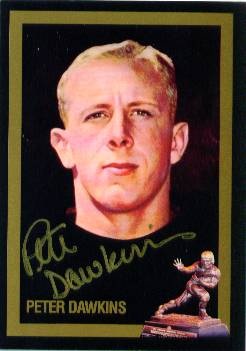There was a time when the Heisman Trophy winner embodied honor, class and dignity. Pete Dawkins of West Point won the trophy, emblematic of the finest collegiate football player, during his senior season as a West Point cadet in 1958. He excelled on the gridiron and in the classroom. He was the first and only cadet to ever simultaneously be the captain of the football team, the president of his class, the Cadet Brigade Commander, and a “Star Man,” awarded to a student in the top 5% of academic standing in their class. Dawkins won the Heisman, earned a degree in Engineering, was commissioned as an Army officer, and was awarded a Rhodes Scholarship to study at Oxford University in England.
He graduated from Oxford with a degree in Philosophy, Politics and Economics, and later attained both a Master’s Degree and a Ph.D. from Princeton University. He served in the Army for 24 years, transitioning from the infantry Rangers to the 82nd Airborne paratroopers to leadership positions that culminated in his role as Brigadier General.
Dawkins was stricken with a critical case of polio at age 11. He survived, albeit with a twisted and bent spine. Standard treatment was temporary incapacitation via a constricting body brace that rendered the disfigurement of the spine permanent. Dawkins and his mother refused, and instead found an aggressive physical therapist who prescribed a vigorous series of weightlifting exercises to which Dawkins ascribed for 2 years. His devotion and prodigious effort straightened his spine and led to a life-long devotion to the training of his body.
Dawkins weighed 98 pounds as a high school freshman, after the completion of his polio rehabilitation. He continued his regimen with weights and weighed 185 pounds as a high school senior. He decided to attend West Point at the urging of his high school football coach but was unable to secure an appointment. His coach packed him in a car and drove 6 hours, one way, to the West Point campus in an effort to meet the football coach. They did not have an appointment, so they waited in his office lobby for 6 hours until he took pity on them and agreed to meet them. Within 5 minutes, Dawkins was offered a scholarship.
West Point did not allow cadets to lift weights. That didn’t stop Dawkins, who smuggled in his own weight set and hid it under his bed-frame and mattress. He lifted weights, in silence and in the dark, every night after curfew. By his senior season, he weighed 215 pounds and was one of the largest, strongest running backs in the country. He also found time to play baseball and serve as co-captain of the hockey team.
Dawkins sought deliberate challenges and met those challenges in every aspect of his life, on the sporting field and off. He continues to lead by great example today, in the business community and as a proponent of college athletics. His Heisman season, and his lifetime of greatness, will always be remembered.
From September 2010, http://raising-a-man.tumblr.com
He graduated from Oxford with a degree in Philosophy, Politics and Economics, and later attained both a Master’s Degree and a Ph.D. from Princeton University. He served in the Army for 24 years, transitioning from the infantry Rangers to the 82nd Airborne paratroopers to leadership positions that culminated in his role as Brigadier General.
Dawkins was stricken with a critical case of polio at age 11. He survived, albeit with a twisted and bent spine. Standard treatment was temporary incapacitation via a constricting body brace that rendered the disfigurement of the spine permanent. Dawkins and his mother refused, and instead found an aggressive physical therapist who prescribed a vigorous series of weightlifting exercises to which Dawkins ascribed for 2 years. His devotion and prodigious effort straightened his spine and led to a life-long devotion to the training of his body.
Dawkins weighed 98 pounds as a high school freshman, after the completion of his polio rehabilitation. He continued his regimen with weights and weighed 185 pounds as a high school senior. He decided to attend West Point at the urging of his high school football coach but was unable to secure an appointment. His coach packed him in a car and drove 6 hours, one way, to the West Point campus in an effort to meet the football coach. They did not have an appointment, so they waited in his office lobby for 6 hours until he took pity on them and agreed to meet them. Within 5 minutes, Dawkins was offered a scholarship.
West Point did not allow cadets to lift weights. That didn’t stop Dawkins, who smuggled in his own weight set and hid it under his bed-frame and mattress. He lifted weights, in silence and in the dark, every night after curfew. By his senior season, he weighed 215 pounds and was one of the largest, strongest running backs in the country. He also found time to play baseball and serve as co-captain of the hockey team.
Dawkins sought deliberate challenges and met those challenges in every aspect of his life, on the sporting field and off. He continues to lead by great example today, in the business community and as a proponent of college athletics. His Heisman season, and his lifetime of greatness, will always be remembered.
From September 2010, http://raising-a-man.tumblr.com

 RSS Feed
RSS Feed
